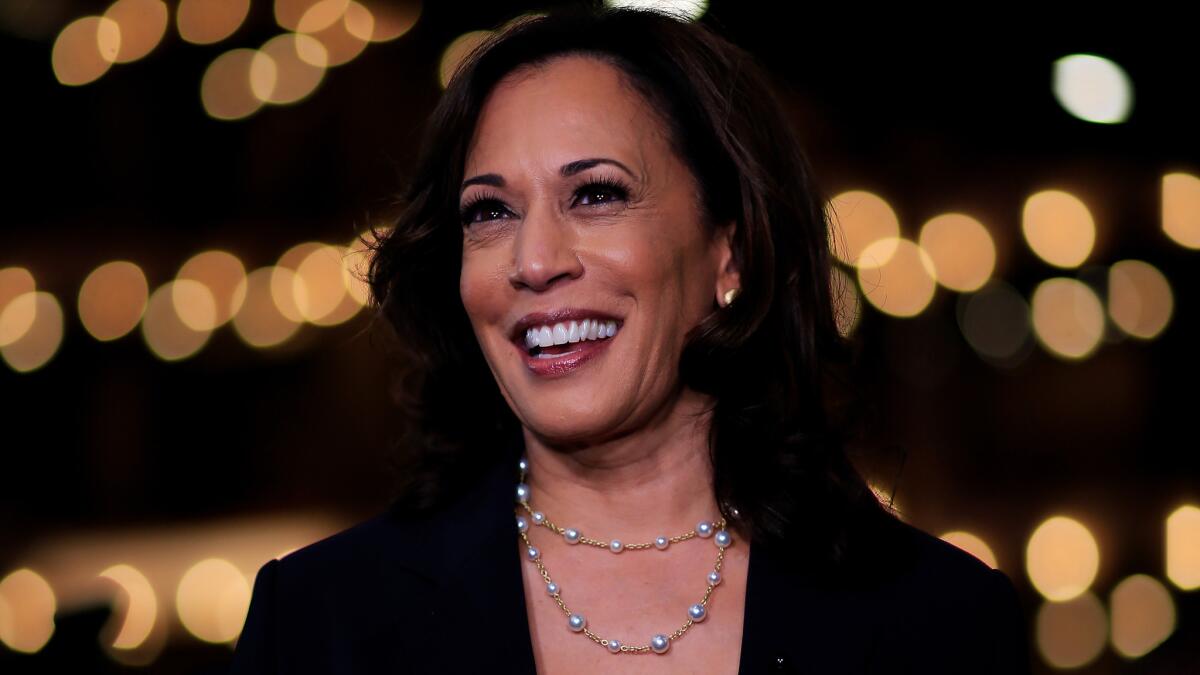Editorial: Kamala Harris is a vice president-elect like no other

- Share via
The glass ceiling that Sen. Kamala Harris just broke Saturday when she became the first woman ever to be elected vice president of the United States may not be the highest in American politics, but it’s as close as they come. Harris also has the distinction of being the first Black and first Indian American vice president-elect.
President Trump is disputing the results, which are still being litigated in court. Nevertheless, electoral politics have almost certainly been changed forever, a mere 100 years after the 19th Amendment guaranteed women an equal place in the voting booth. “I can’t imagine on the Democratic side ever seeing another ticket that is two white men,” says Debbie Walsh, the director of the Center for American Women and Politics at Rutgers University.
In some ways, this moment seemed inevitable. Look at the unprecedented number of women — six, including Harris — who ran as Democrats for president this election cycle. A woman was the Democratic nominee for president four years ago. Female voters — particularly Black female voters — are essential to Democratic victories. Why wouldn’t there be a Black female running mate?
Well, here’s why: We are not in a post-sexist society — not any more than we were in a post-racial society in 2009 when President Obama entered the White House or in 2017 when he left it.
So, the elevation of Harris, 56, is a profoundly big deal. It’s made even bigger by the fact that Biden will be the oldest man — at 78 — to become president. If he doesn’t seek a second term, Harris will occupy the pole position in the race to replace him.
Harris is part of a tiny sorority of women — three — who have even been nominated for vice president by a major party.
The first was Rep. Geraldine Ferraro (D-N.Y.), a former Queens prosecutor plucked from relative obscurity in the House of Representatives. Pressured by women’s advocates and believing there was a gender gap to fill, former Vice President Walter Mondale picked Ferraro as his running mate to try to spark his struggling campaign in 1984. Incumbent Ronald Reagan beat them in a landslide. Ferraro died in 2011.
The second was Sarah Palin, the little-known first-term Republican governor of Alaska. Sen. John McCain (R-Ariz.) made the admittedly unorthodox pick of Palin to be his running mate in 2008 in the hope of trimming Obama’s lead in the polls. But the choice backfired after Palin’s inexperience showed through in interviews and on the debate stage, and Obama won easily.
It’s a reminder of the rarity of female vice presidential candidates that Palin, the polar opposite of Harris in politics and beliefs, took to Instagram to offer some friendly, nonpartisan advice after Biden announced her selection. “Climb upon Geraldine Ferraro’s and my shoulders, and from the most amazing view in your life consider lessons we learned.” Palin wrote. Among those lessons: “[D]on’t get muzzled.”
Covering Kamala Harris
It’s difficult to believe that Harris, a former San Francisco district attorney and California attorney general who made a reputation in the Senate for asking tough questions, would ever let anyone do that. Witness how she stopped Vice President Mike Pence from talking over her during their debate; that alone makes her a role model for women young and old.
But her election is more than just a milestone for women. “In a time when we have a battered democracy, it will restore some sense of trust,” says USC professor Ange-Marie Hancock Alfaro. For younger voters, especially younger Black voters, Harris’ election may be proof that voting — not just protesting — can bring change.
What can Harris do with her new platform? The vice presidency, after all, is a position with little inherent authority.
“I don’t think Kamala Harris will be a marginalized vice president who will sit over in a corner,” says Walsh. And Biden has made it clear that he wants Harris to be the same sort of trusted advisor that he was for Obama. “I asked Kamala to be the last voice in the room,” Biden said.
Now he should give her the portfolio with which to use it.
Harris could shepherd the bipartisan commission that Biden has promised to create to study the Supreme Court and the federal judiciary. She could work with the secretary of the Treasury to address inequities in banking and mortgage lending, one of her top issues as attorney general.
With abortion rights at risk, Harris could revive her proposal to give the Justice Department authority to preapprove abortion laws proposed by any state that had enacted abortion restrictions deemed unconstitutional by the courts. Or she could work to win support in Congress for legislation to bar states from adopting onerous restrictions on abortion providers and patients.
This editorial board criticized Harris for not taking strong positions on controversial topics when she was attorney general. As vice president, Harris needs to be a strong voice — and to not let anyone interrupt her when she’s using it.
More to Read
A cure for the common opinion
Get thought-provoking perspectives with our weekly newsletter.
You may occasionally receive promotional content from the Los Angeles Times.











